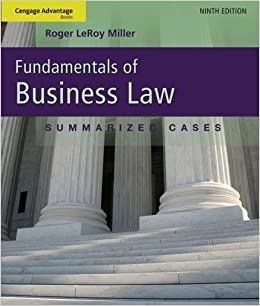
Cengage Advantage Books: Fundamentals of Business Law 9th Edition by Roger LeRoy Miller
Edition 9ISBN: 978-1111530624
Cengage Advantage Books: Fundamentals of Business Law 9th Edition by Roger LeRoy Miller
Edition 9ISBN: 978-1111530624 Exercise 14
Hadley v. Baxendale
Court of Exchequer, 156 Eng.Rep. 145 (1854).
FACTS The Hadleys (the plaintiffs) ran a flour mill in Gloucester, England. The main crankshaft attached to the steam engine in the mill broke, causing the mill to shut down. The crankshaft had to be sent to a foundry located in Greenwich so that a new shaft could be made to fit the other parts of the engine. Baxendale, the defendant, was a common carrier that transported the shaft from Gloucester to Greenwich. The freight charges were collected in advance, and Baxendale promised to deliver the shaft the following day. It was not delivered for a number of days, however. As a consequence, the mill was closed for several days. The Hadleys sued to recover the profits lost during that time. Baxendale contended that the loss of profits was "too remote" to be recoverable. The court held for the plaintiffs, and the jury was allowed to take into consideration the lost profits. The defendant appealed.
ISSUE Did Baxendale have reason to know that a delay in delivering the crankshaft would cause the mill to shut down?
DECISION No. The Court of Exchequer reversed the decision of the lower court and ordered a new trial at which the lost profits could not be awarded.
REASON According to the court, to collect consequential damages, the plaintiffs would have to have given express notice of the special circumstances that cause the loss of profit. The only circumstances communicated by the Hadleys to Baxendale at the time the contract was made were that (1) the item to be transported was a broken crankshaft of a mill and (2) the Hadleys were the owners and operators of that mill. The court reasoned that these circumstances did not reasonably indicate that the mill would have to stop operations if the delivery of the crankshaft was delayed.
FOR CRITICAL ANALYSIS-E-Commerce Consideration If a Web merchant loses business due to a computer system's failure that can be attributed to malfunctioning software, can the merchant recover the lost profits from the software maker? Explain.
IMPACT OF THIS CASE ON TODAY'S LAW This case established the rule that when damages are awarded, compensation is given only for those injuries that the defendant could reasonably have foreseen as a probable result of the usual course of events following a breach. Today, the rule enunciated by the court in this case still applies. To recover consequential damages, the plaintiff must show that the defendant had reason to know or foresee that a particular loss or injury would occur.
Court of Exchequer, 156 Eng.Rep. 145 (1854).
FACTS The Hadleys (the plaintiffs) ran a flour mill in Gloucester, England. The main crankshaft attached to the steam engine in the mill broke, causing the mill to shut down. The crankshaft had to be sent to a foundry located in Greenwich so that a new shaft could be made to fit the other parts of the engine. Baxendale, the defendant, was a common carrier that transported the shaft from Gloucester to Greenwich. The freight charges were collected in advance, and Baxendale promised to deliver the shaft the following day. It was not delivered for a number of days, however. As a consequence, the mill was closed for several days. The Hadleys sued to recover the profits lost during that time. Baxendale contended that the loss of profits was "too remote" to be recoverable. The court held for the plaintiffs, and the jury was allowed to take into consideration the lost profits. The defendant appealed.
ISSUE Did Baxendale have reason to know that a delay in delivering the crankshaft would cause the mill to shut down?
DECISION No. The Court of Exchequer reversed the decision of the lower court and ordered a new trial at which the lost profits could not be awarded.
REASON According to the court, to collect consequential damages, the plaintiffs would have to have given express notice of the special circumstances that cause the loss of profit. The only circumstances communicated by the Hadleys to Baxendale at the time the contract was made were that (1) the item to be transported was a broken crankshaft of a mill and (2) the Hadleys were the owners and operators of that mill. The court reasoned that these circumstances did not reasonably indicate that the mill would have to stop operations if the delivery of the crankshaft was delayed.
FOR CRITICAL ANALYSIS-E-Commerce Consideration If a Web merchant loses business due to a computer system's failure that can be attributed to malfunctioning software, can the merchant recover the lost profits from the software maker? Explain.
IMPACT OF THIS CASE ON TODAY'S LAW This case established the rule that when damages are awarded, compensation is given only for those injuries that the defendant could reasonably have foreseen as a probable result of the usual course of events following a breach. Today, the rule enunciated by the court in this case still applies. To recover consequential damages, the plaintiff must show that the defendant had reason to know or foresee that a particular loss or injury would occur.
Explanation
Facts:
The plaintiff H operate a mill i...
Cengage Advantage Books: Fundamentals of Business Law 9th Edition by Roger LeRoy Miller
Why don’t you like this exercise?
Other Minimum 8 character and maximum 255 character
Character 255


